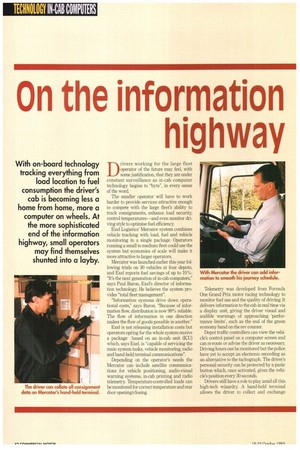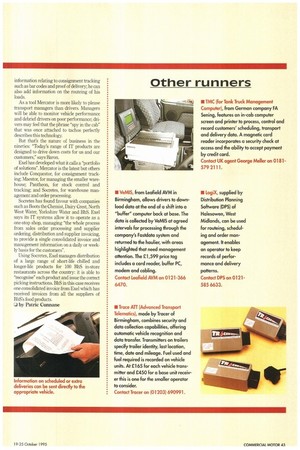On the information highway
Page 44

Page 45

If you've noticed an error in this article please click here to report it so we can fix it.
Drivers working for the large fleet operator of the future may feel, with some justification, that they are under constant surveillance as in-cab computer technology begins to "byte", in every sense of the word.
The smaller operator will have to work harder to provide services attractive enough to compete with the large fleet's ability to track consignments, enhance load security, control temperatures—and even monitor driving style to optimise fuel efficiency Exel Logistics' Mercator system combines vehicle tracking with load, fuel and vehicle monitoring in a single package. Operators running a small to medium fleet could use the system but economies of scale will make it more atil active to larger operators.
Mercator was launched earlier this year following trials on 30 vehicles at four depots, and Exel reports fuel savings of up to 10%: "It's the next generation of in-cab computers," says Paul Baron, Exel's director of information technology He believes the system provides "total fleet management".
"Information systems drive down operational costs," says Baron. "Because of information flow, distribution is now 99% reliable. The flow of information in one direction makes the flow of goods possible in another."
Exel is not releasing installation costs but operators opting for the whole system receive a package based on an in-cab unit (ICU) which, says Exel, is "capable of servicing the main system tasks, vehicle monitoring, radio and hand-held terminal communications".
Depending on the operator's needs the Mercator can include satellite communications for vehicle positioning, audio-visual warning systems, in-cab printing and radio telemetry. Temperature-controlled loads can be monitored for correct temperature and rear door opening/closing. Telemetry was developed from Formula One Grand Prix motor racing technology to monitor fuel use and the quality of driving. It delivers information to the cab in real time via a display unit, giving the driver visual and audible warnings of approaching 'performance limits', such as the end of the green economy band on the rev counter.
Depot traffic controllers can view the vehicle's control panel on a computer screen and can re-route or advise the driver as necessary Driving hours can be monitored but the police have yet to accept an electronic recording as an alternative to the tachograph. The driver's personal security can be protected by a panic button which, once activated, gives the vehicle's position every 30 seconds.
Drivers still have a role to play amid all this high-tech wizardry. A hand-held terminal allows the driver to collect and exchange
information relating to consignment tracking such as bar codes and proof of delivery; he can also add information on the routeing of his loads.
As a tool Mercator is more likely to please transport managers than drivers. Managers will be able to monitor vehicle performance and debrief drivers on poor performance; drivers may feel that the phrase "spy in the cab" that was once attached to tachos perfectly describes this technology.
But that's the nature of business in the nineties: "Today's range of IT products are designed to drive down costs for us and our customers," says Baron.
Exel has developed what it calls a "portfolio of solutions". Mercator is the latest but others include Conquestor, for consignment tracking; Maestor, for managing the smaller warehouse; Pantheon, for stock control and tracking; and Socretes, for warehouse management and order processing.
Socretes has found favour with companies such as Boots the Chemist, Dairy Crest, North West Water, Yorkshire Water and BhS. Exel says its IT systems allow it to operate as a one-stop shop, managing "the whole process from sales order processing and supplier ordering, distribution and supplier invoicing, to provide a single consolidated invoice and management information on a daily or weekly basis for the customers".
Using Socretes, Exel manages distribution of a large range of short-life chilled and longer-life products for 100 RhS in-store restaurants across the country: it is able to "recognise" each product and issue the correct picking instructions. BhS in this case receives one consolidated invoice from Exel which has received invoices from all the suppliers of BhS's food products.
tJ by Patric Clumane




















































































































